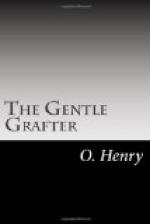“‘The lead in it is worth more than that,’ says I, dignified. I put it back in my pocket.
“‘All right,’ says he. ’But I sort of wanted it for the collection I’m starting. I got a $5,000 one last week for $2.10.’
“Just then a telephone bell rings in the house.
“‘Come in, Bunk,’ says the farmer, ’and look at my place. It’s kind of lonesome here sometimes. I think that’s New York calling.’
“We went inside. The room looked like a Broadway stockbroker’s—light oak desks, two ’phones, Spanish leather upholstered chairs and couches, oil paintings in gilt frames a foot deep and a ticker hitting off the news in one corner.
“‘Hello, hello!’ says this funny farmer. ’Is that the Regent Theatre? Yes; this is Plunkett, of Woodbine Centre. Reserve four orchestra seats for Friday evening—my usual ones. Yes; Friday—good-bye.’
“‘I run over to New York every two weeks to see a show,’ says the farmer, hanging up the receiver. ’I catch the eighteen-hour flyer at Indianapolis, spend ten hours in the heyday of night on the Yappian Way, and get home in time to see the chickens go to roost forty-eight hours later. Oh, the pristine Hubbard squasherino of the cave-dwelling period is getting geared up some for the annual meeting of the Don’t-Blow-Out-the-Gas Association, don’t you think, Mr. Bunk?’
“‘I seem to perceive,’ says I, ’a kind of hiatus in the agrarian traditions in which heretofore, I have reposed confidence.’
“‘Sure, Bunk,’ says he. ’The yellow primrose on the river’s brim is getting to look to us Reubs like a holiday edition de luxe of the Language of Flowers with deckle edges and frontispiece.’
“Just then the telephone calls him again.
“‘Hello, hello!’ says he. ’Oh, that’s Perkins, at Milldale. I told you $800 was too much for that horse. Have you got him there? Good. Let me see him. Get away from the transmitter. Now make him trot in a circle. Faster. Yes, I can hear him. Keep on—faster yet. ... That’ll do. Now lead him up to the phone. Closer. Get his nose nearer. There. Now wait. No; I don’t want that horse. What? No; not at any price. He interferes; and he’s windbroken. Goodbye.’
“‘Now, Bunk,’ says the farmer, ’do you begin to realize that agriculture has had a hair cut? You belong in a bygone era. Why, Tom Lawson himself knows better than to try to catch an up-to-date agriculturalist napping. It’s Saturday, the Fourteenth, on the farm, you bet. Now, look here, and see how we keep up with the day’s doings.’
“He shows me a machine on a table with two things for your ears like the penny-in-the-slot affairs. I puts it on and listens. A female voice starts up reading headlines of murders, accidents and other political casualities.
“‘What you hear,’ says the farmer, ’is a synopsis of to-day’s news in the New York, Chicago, St. Louis and San Francisco papers. It is wired in to our Rural News Bureau and served hot to subscribers. On this table you see the principal dailies and weeklies of the country. Also a special service of advance sheets of the monthly magazines.’




